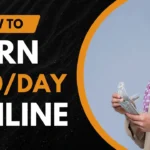How to Make Money from Blogging : Blogging is no longer just a passion project or an online journal. Today, it’s a legitimate way to earn a steady income, offering freedom and flexibility—qualities that resonate with freelancers, digital nomads, work-from-home seekers, and even dedicated online shoppers. If you’ve always thought about starting a blog but hesitated because you weren’t sure where to begin—or how to make money from it—this guide is for you.
Whether you’re aiming to earn a part-time side income or replace a full-time salary, this article will walk you through the essential steps to make money from blogging. We’ll cover everything from identifying a profitable niche to creating content, monetizing strategies, and finally, scaling your blog into a revenue-generating machine.
Grab your notepad—it’s time to turn your passion into profit.
What Is Blogging and How Can You Make Money From It?
At its core, blogging is about sharing your knowledge, insights, or interests through written content published on a website. While bloggers initially created personal diaries online, the landscape has shifted dramatically. Blogging is now a business, offering the potential to earn income through multiple streams.
Successful bloggers generate money by leveraging their digital real estate (their blog) using methods including affiliate marketing, selling premium products, gaining sponsorship deals, or earning ad revenue. However, building a profitable blog from scratch takes time, effort, and strategy.
Why Blogging Is a Great Opportunity
- Low Start-Up Costs: All you need is a hosted platform and a domain name to start.
- Work From Anywhere: The digital nature of blogging allows flexibility.
- Diverse Income Streams: Bloggers can tap into various monetization strategies for different revenue sources.
If you’re ready to explore this, keep reading.
Step 1: Understand Your Niche – Identifying Profitable Blog Topics
The first step in creating a money-making blog is to choose the right niche. Your niche is the foundation of your blog—it’s what you’ll write about, and ultimately what you’ll monetize.
How to Choose a Niche
- Passion Meets Expertise
Think about topics you’re passionate about but also represent an area of knowledge or expertise. For example, if you’re a fitness enthusiast, you could focus on sustainable workout routines or meal plans.
- Market Demand
Look at niches that are popular but not overly saturated. Use tools like Google Trends, Ahrefs, or SEMrush to research keywords and gauge audience interest.
- Profitability
Consider whether there’s a market willing to spend money on your chosen niche. Niches like personal finance, health, tech, and parenting often come with high monetization opportunities.
Quick Tip: Build a unique angle. For instance, instead of a general ‘travel blog,’ focus on ‘affordable travel for remote workers.’
Step 2: Setting Up Your Blog – Platforms, Domains, and Hosting
Once you’ve identified your niche, it’s time to establish your blog’s digital presence. Setting up your blog involves choosing the right tools and platforms.
Choose the Right Blogging Platform
- WordPress.org (Self-hosted): The most popular platform for serious bloggers, offering customisation and scalability.
- Wix or Squarespace: Great for simplicity and all-in-one hosting.
- Substack or Medium: Suited for writers focused on content only.
Get a Memorable Domain Name
Your domain name is your blog’s unique web address. Choose something short, catchy, and reflective of your niche (e.g., “BudgetBackpacker.com”).
Secure Reliable Hosting
Pick a hosting provider like Bluehost, SiteGround, or HostGator to ensure speed, uptime, and security. Your blog’s performance lies heavily on hosting quality, so choose wisely.
Step 3. Create Valuable Content – Tips for Engaging Blog Posts
Without valuable content, your blog is little more than a blank slate. Great content captures readers’ attention and keeps them coming back for more.
What Makes Content Valuable?
- Relevance: Address the needs and interests of your audience.
- Originality: Offer unique perspectives or solutions.
- Actionability: Provide tangible knowledge or takeaways.
Content Ideas to Kickstart Your Blog
- Beginner guides
- Tutorials
- Reviews (e.g., product or service reviews)
- How-to articles
- Personal experiences in your niche
Quick Tip: Create a content calendar to stay organised and consistent.
Step 4. Monetising Your Blog – From Affiliate Marketing to Product Sales
Once you’ve built a base of content and traffic, it’s time to turn your blog into an income stream.
Top Monetization Strategies
- Affiliate Marketing
Earn a commission by promoting products or services and linking them to affiliate programmes like Amazon Associates or ShareASale.
- Ad Revenue
Use Google AdSense or Mediavine to run ads on your blog and earn passive income based on impressions or clicks.
- Product or Service Sales
Offer something tangible like e-books, courses, coaching sessions, or merchandise.
- Sponsorship Deals
Partner with brands to create sponsored posts or videos that align with your niche.
Tip: Diversify your income streams rather than relying on just one.
Step 5. Build Your Audience – SEO, Social Media, and Email Marketing
Your path to making money depends on attracting traffic. Building an audience is not just about marketing—it’s about fostering relationships.
Master SEO
SEO drives organic traffic. Focus on:
- Optimising titles and headings
- Using keywords naturally
- Internal linking
- Page speed and mobile-friendliness
Leverage Social Media
Promote your blog on social platforms like Instagram, Pinterest, LinkedIn, or YouTube to engage with your audience.
Grow an Email List
Use tools like Mailchimp or ConvertKit to save contacts directly. With an email list, you can nurture leads and send updates about new content or offers.
Step 6. Learn From Others – Case Studies of Successful Bloggers
There’s no better way to learn than from those who’ve already succeeded. Here are two real-life examples:
- Pat Flynn (Smart Passive Income)
Pat turned blogging into a full-fledged business, earning six figures by selling digital courses, books, and affiliate marketing.
- Michelle Schroeder-Gardner (Making Sense of Cents)
Michelle generated $100,000 per month by sharing personal-finance tips and using affiliate marketing to recommend tools and services her audience loves.
Step 7. Essential Tools for Bloggers – Your Blogging Toolkit
These tools make blogging life easier:
- Grammarly: For grammar checking and improving clarity.
- Canva: For creating compelling blog post graphics.
- Google Analytics: To track traffic and audience behaviour.
- Outwrite: An AI-driven tool for enhancing your written prose.
- Hootsuite: For scheduling and managing your social media posts.
Investing in the right tools will save time and improve your efficiency dramatically.
Take the First Step Towards Blogging Success
Blogging is a marathon, not a sprint. It’s about consistently creating value for your audience while refining your strategy over time.
Follow the steps outlined in this guide—find a niche, create high-quality content, build an audience, and explore diverse monetization strategies. With dedication, you could build a blog that supports your financial freedom and lifestyle goals.
Are you ready to start your blogging journey? Share your thoughts below or tell us the niche you’re considering!


